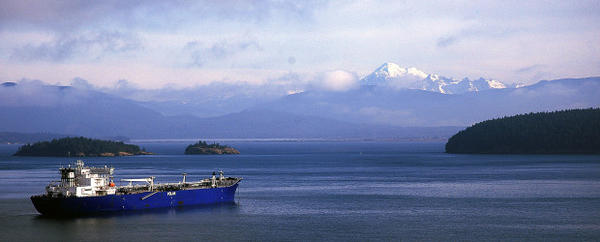BC Pipeline Approval Will Bring More Chinese Oil Tankers To Puget Sound
By ASHLEY AHEARN • NOV 29, 2016
The Canadian government approved a crude-oil pipeline project that is much larger than the one generating protests in North Dakota and could bring a seven-fold increase in tanker traffic to the Salish Sea.
Canadian Prime Minister Justin Trudeau approved the Kinder-Morgan, Trans-mountain pipeline expansion project. The pipeline currently brings crude from Alberta’s oil sands region to the coast of British Columbia.
Now the company is approved to more than double the pipeline’s capacity.
That could mean a significant increase in the number of oil tankers traveling to and from the pipeline terminal, through the Strait of Juan de Fuca and northern Puget Sound. Right now there’s one tanker making that trip per week. When the pipeline’s expanded, that could increase to more than one oil tanker per day.
The Tsleil-Waututh nation of British Columbia called the permits “illegitimate” and said the issue is as black and white as the killer whales the oil ships will endanger. The tribe said it will fight the decision in court.
Trudeau previously rejected the Northern Gateway project to northwest British Columbia which passes through the Great Bear Rainforest. Northern Gateway would have transported 525,000 barrels of oil a day from Alberta's oil sands to the Pacific to deliver oil to oil-hungry China.
"The Great Bear Rainforest is no place for a pipeline and the Douglas Channel is no place for oil tanker traffic," Trudeau said.
These are the first major pipeline decisions for Trudeau, whose Liberal government is trying to balance the oil industry's desire to tap new markets in Asia with environmentalists' concerns.
Alberta, which has the world's third largest oil reserves, needs infrastructure in place to export its growing oil sands production. Approving Trans Mountain helps diversify Canada's oil exports. Ninety-seven percent of Canadian oil exports now go to the U.S.
The importance of Trudeau's decisions on pipelines only grew after the Obama administration turned down TransCanada's Keystone XL pipeline that would have taken Alberta oil to the U.S. Gulf Coast. President-elect Donald Trump has expressed support for Keystone XL.
Trudeau noted that more oil would end up being transported by rail if more pipelines are not built.

No comments:
Post a Comment
Comments always welcome!